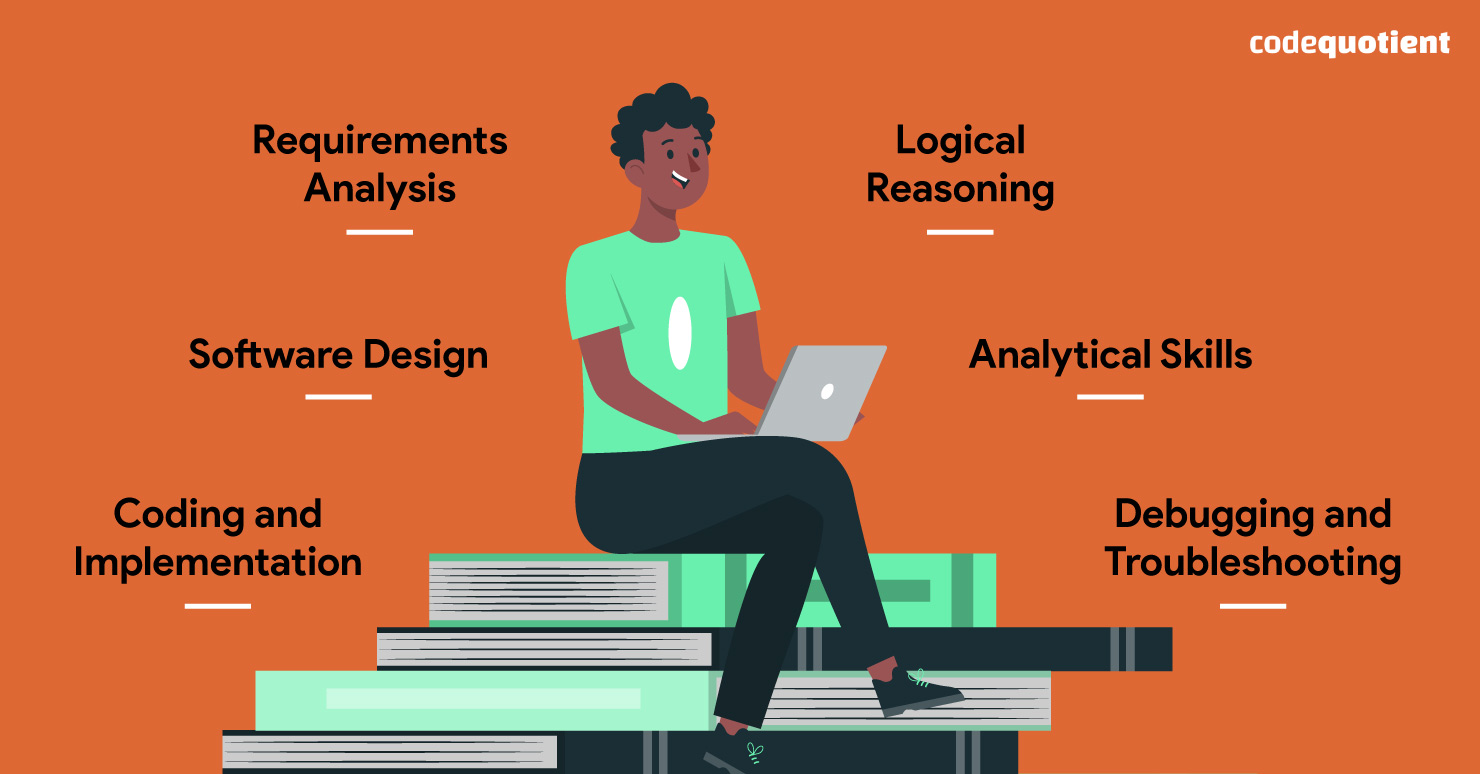The CodeQuotient’s Software Engineering Program (CQ-SEP) is an exceptional opportunity for aspiring software engineers. It not only offers a UGC-recognized degree but also equips students with in-demand coding skills and provides paid internships.
To secure a place in this prestigious program, it is crucial to master a few key areas that form the foundation of a successful software engineering career.
Improving in these focus areas paves the way for a successful software engineering career and equips individuals with the necessary skills and knowledge to thrive in the tech industry.
This article aims to provide valuable insights and guidance to aspiring software engineers who aspire to excel in their software engineering careers through the CQ-SEP program.
Understanding the Software Engineering Career Path
Software engineering is a rapidly growing field with a wide range of career opportunities.
1. Exploring the software engineering profession and its growing demand
The field of software engineering has witnessed remarkable growth and continues to be in high demand.
They are responsible for designing, developing, and maintaining software applications, systems, and websites. The demand for skilled software engineers has surged with the increasing reliance on technology and digital transformation across sectors.
Professionals in this field have the opportunity to work on cutting-edge technologies, solve complex problems, and contribute to the creation of innovative software solutions that shape the world around us. The software engineering profession presents diverse industries to work in, including finance, healthcare, e-commerce, gaming, and more.
2. Technical Proficiency
To excel in the CQ-SEP program and succeed as a software engineer, it is crucial to excel in the following key technical areas:
- Programming Languages: Mastery of Java, Python, C++, and more is essential for efficient and scalable code, algorithm implementation, and robust applications.
- Data Structures and Algorithms: Understanding arrays, linked lists, sorting, and searching is vital for effective problem-solving and handling large datasets.
- Web Development: Knowledge of HTML, CSS, JavaScript, and frameworks like React or Angular enhances interactive and responsive web application development.
- Database Management: Proficiency in SQL and database design ensures efficient structures, optimized queries, and data integrity and security.
3. Potential career opportunities and advancement prospects
A career in software engineering offers abundant opportunities for professional growth and advancement. As a software engineer, one can specialise in various domains such as web development, mobile app development, data science, artificial intelligence, cybersecurity, and more.
Furthermore, the field of software engineering is known for its continuous learning and innovation. As technology evolves, software engineers have the opportunity to update their skills, stay abreast of emerging trends, and adopt new tools and frameworks.
Crucial Skills for CQ-SEP: Key Areas to Focus on for Admission

To excel in the CQ-SEP program and stand out in the competitive software engineering landscape, aspiring students should focus on learning several key areas:
Software Development Lifecycle
To succeed in the software engineering field and secure selection in CQ-SEP, it is vital to master the following aspects of the software development lifecycle:
1. Requirements Analysis
Software engineers must possess the ability to gather and analyse client needs effectively. This involves understanding the project requirements, communicating with stakeholders, and translating their requirements into functional specifications for development.
2. Software Design
Understanding software architecture and system design principles is crucial. Software engineers must create scalable and efficient designs that meet the project requirements. This includes designing the overall structure of the software system, considering factors like modularity, reusability, and maintainability.
3. Coding and Implementation
Writing clean, maintainable, and efficient code is a fundamental skill for software engineers. This involves applying best coding practices, following coding standards, and using appropriate design patterns.
4. Testing and Quality Assurance
Having knowledge of testing methodologies and tools is essential. Software engineers should understand different testing techniques, including unit, integration, and system testing.
Problem-Solving and Critical Thinking
Problem-solving and critical thinking skills are vital for software engineers. To grasp this area, aspiring students should focus on the following:
1. Logical Reasoning
Developing logical thinking is crucial. This involves understanding how to approach problems methodically, applying logical reasoning to identify patterns and find solutions, and making informed decisions.
2. Analytical Skills
Software engineers must have strong analytical skills to break down complex problems into smaller, manageable tasks. This involves analysing requirements, identifying dependencies, and planning a systematic approach to problem-solving.
3. Debugging and Troubleshooting
Software engineers should be equipped with techniques for identifying and resolving software issues. This includes understanding debugging tools, interpreting error messages, and effectively troubleshooting problems that arise during development or in production environments.
Mastering the Path: Preparing for Success in the CQ-SEP Admission Process
Preparing effectively for the admission process is important to increase your chances of selection in CQ-SEP. Here’s what you can do:
1. Familiarising with the CQ-SEP Curriculum and Requirements
Take the time to understand the curriculum structure, subjects covered, and the overall requirements of the program. This will give you a clear idea of what to expect and help you align your preparation accordingly.
2. Preparing for the SEPAT (Software Engineering Program Admission Test)
The SEPAT is an essential component of the admission process. To excel in this test, focus on the following:
- The SEPAT will assess your logical reasoning abilities and problem-solving skills. Practice solving puzzles, riddles, and coding problems to enhance your logical thinking abilities.
- Seek resources such as sample questions, online tutorials, and practice tests aligned with the SEPAT format.
3. Interaction and Counseling
The interaction session plays a crucial role in the admission process. It allows you to showcase your passion for software engineering and demonstrate your motivation to pursue a career in this field.
Securing Your Future in Software Engineering: The Path to CQ-SEP and Beyond
Securing selection in CQ-SEP requires thorough preparation and a strong foundation in key areas of software engineering.
Emphasising the significance of a robust foundation in software engineering skills, CQ-SEP provides a platform for aspiring students to embark on their software engineering career journey.
Take the first step towards your software engineering career goals by applying to CQ-SEP today. Limited seats are available, so seize this opportunity now. Your future as a skilled software engineer awaits!




